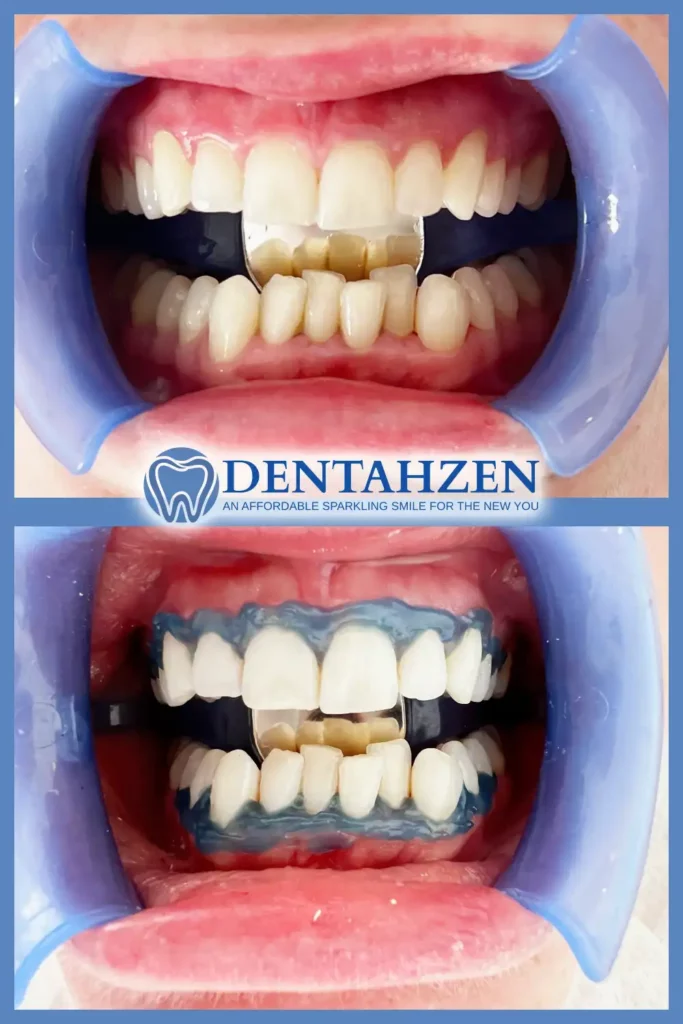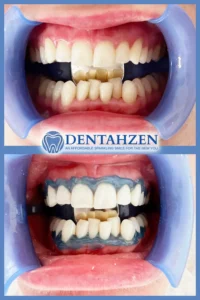Teeth Whitening Risks and Side Effects
In this article we will explore the Teeth Whitening Risks and Side Effects for individuals considering teeth whitening. Teeth whitening, although popular for its ability to enhance one’s smile, does come with its own set of risks and side effects. It is essential for individuals considering teeth whitening to be aware of these potential outcomes before undergoing the procedure.


One of the primary risks associated with teeth whitening is tooth sensitivity. The bleaching agents used in the whitening process can sometimes penetrate the tooth enamel, causing temporary sensitivity to hot and cold temperatures. This sensitivity typically subsides within a few days, but it can be quite uncomfortable during that time. Additionally, some people may experience gum irritation as a side effect, resulting in redness, swelling, or even blistering. This risk can be minimized by using whitening products under professional supervision.
In order to make an informed decision, individuals should carefully weigh the pros and cons of teeth whitening and consider its potential risks and side effects. By understanding the possible outcomes and taking appropriate precautions, one can mitigate the risks and enjoy the benefits of a brighter smile.
Key Takeaways
- Tooth sensitivity is a common risk associated with teeth whitening
- Bleaching agents can penetrate the tooth enamel, causing temporary sensitivity to hot and cold temperatures
- Sensitivity usually subsides within a few days but can be uncomfortable during that time
- Gum irritation may occur as a side effect of teeth whitening
- Irritation can result in redness, swelling, or blistering of the gums
- Professional supervision can help minimize the risk of gum irritation
- It is important for individuals to carefully consider the potential risks and side effects before undergoing teeth whitening
- By understanding these outcomes and taking appropriate precautions, one can mitigate the risks and enjoy a brighter smile
Introduction to Teeth Whitening Risks and Side Effects
Teeth whitening has become increasingly popular in recent years, as more and more people strive for a brighter, whiter smile. However, it is important to be aware of the teeth whitening risks and side effects that can come along with this cosmetic procedure.
One of the main risks associated with teeth whitening is tooth sensitivity. Many individuals experience increased sensitivity to hot and cold temperatures after undergoing the procedure. This sensitivity can be temporary or long-lasting, depending on the individual and the specific treatment used. Another potential risk is gum irritation, which can cause discomfort and inflammation in the gums. It is essential to take these risks into consideration before deciding to undergo teeth whitening treatment, as they can significantly impact oral health and overall well-being.
What is teeth whitening?
Teeth whitening is a cosmetic dental procedure that aims to lighten the color of teeth and remove stubborn stains. It is a popular treatment option for individuals who desire a brighter, more youthful smile. This procedure can be performed by a dental professional or through various over-the-counter products. In Kusadasi, there are several dental clinics that offer professional teeth whitening services, using advanced techniques and high-quality whitening agents.
One of the most common teeth whitening methods involves the use of bleaching agents, such as hydrogen peroxide or carbamide peroxide. These agents penetrate the enamel and break down the molecules that cause discoloration, resulting in a whiter shade. Teeth whitening treatments can be conducted at the dental clinic under the supervision of a trained dentist, ensuring safety and efficacy. Alternatively, individuals can opt for at-home whitening kits, which typically involve the use of customized trays and whitening gels. However, it is important to follow the instructions carefully and consult with a dental professional to avoid any potential risks or side effects associated with DIY teeth whitening.
Why do people opt for teeth whitening?
Teeth whitening has become increasingly popular in recent years, attracting individuals from all walks of life. There are several reasons why people choose to undergo teeth whitening treatments. Firstly, individuals may opt for teeth whitening to enhance their overall appearance and boost their self-confidence. A bright, white smile is often associated with good oral hygiene and can create a positive first impression. In today’s society, where appearance plays a significant role, teeth whitening has become an essential part of many individuals’ beauty routines.
Furthermore, teeth whitening is frequently sought after by those who want to reverse the effects of staining and discoloration caused by lifestyle choices such as smoking, drinking coffee, tea, or red wine, and consuming certain foods. Despite regular brushing and flossing, these external factors can gradually dull the natural whiteness of teeth. As a result, individuals turn to teeth whitening treatments to achieve a more youthful and vibrant smile. Professional teeth whitening services, like those offered in Teeth Whitening Turkey, provide individuals with efficient and effective treatment options, leading to noticeable results.


Pros of teeth whitening
Teeth whitening has become increasingly popular in recent years, with many people opting for this cosmetic dental treatment to enhance their smile. One of the main advantages of teeth whitening is that it can significantly improve the appearance of your teeth, boosting your self-confidence in the process. Whether it’s for a special occasion or simply to feel more confident in everyday life, teeth whitening can help you achieve a brighter and more attractive smile. Many individuals choose to undergo professional teeth whitening procedures in places like Teeth Whitening Turkey, as they offer safe and effective treatments that deliver quick and noticeable results.
In addition to its cosmetic benefits, teeth whitening also offers the convenience of quick and noticeable results. Professional teeth whitening treatments can produce dramatic changes in the color of your teeth in just one session. This means you can walk into the clinic with stained or discolored teeth and walk out with a gleaming, white smile. Unlike over-the-counter whitening products, professional treatments are tailored to your specific needs and yield more effective and long-lasting results. Overall, the pros of teeth whitening make it an appealing option for those looking to achieve a brighter and more confident smile.
Enhances smile and boosts confidence
Enhancing one’s smile and boosting confidence are often the primary reasons why individuals turn to teeth whitening procedures. By eliminating stains and discoloration, teeth whitening can significantly improve the appearance of teeth, giving individuals a more radiant and attractive smile. Bright, white teeth are often associated with good oral hygiene and can make a positive impression in professional and social settings.
However, it’s important to note that teeth whitening procedures do come with potential risks and side effects. One of the most common side effects is tooth sensitivity, which can occur during or after the whitening process. This sensitivity is often temporary but can cause discomfort when consuming hot or cold foods and drinks. It is crucial to discuss any concerns about tooth sensitivity with a dental professional before proceeding with teeth whitening treatments to ensure a safe and comfortable experience.
Quick and noticeable results
Teeth whitening treatments are increasingly popular due to their ability to deliver quick and noticeable results. With professional teeth whitening procedures, individuals can achieve whiter and brighter teeth in a relatively short period of time. This is particularly beneficial for those looking to enhance their smile for special occasions or boost their confidence in social settings.
However, it is important to note that while quick and noticeable results may be desirable, there are potential risks and side effects associated with teeth whitening. One such side effect is gum irritation. This can occur when the whitening agent used comes into contact with the gums, causing them to become red, swollen, and sensitive. The level of gum irritation can vary from person to person, with some experiencing mild discomfort while others may find it more severe. It is always recommended to consult with a dental professional before undergoing any teeth whitening treatment to minimize the risk of gum irritation and ensure the procedure is carried out safely.
Cons of teeth whitening
Teeth whitening procedures, although popular, are not without their drawbacks. One major concern is the risk of enamel damage. The process of teeth whitening involves the use of bleaching agents, which can weaken the tooth enamel if not used correctly. Enamel damage can result in tooth sensitivity and increased susceptibility to cavities. While the risks are relatively low when the procedure is performed by a professional, it is essential to consider this potential downside before opting for teeth whitening.
Another potential drawback of teeth whitening is gum irritation. The bleaching agents used in the process can sometimes lead to gum inflammation and sensitivity. This can cause discomfort and may require additional treatment to alleviate the symptoms. Though not everyone experiences this side effect, it is important to be aware of the possibility and consult a dental professional if any irritation or discomfort arises during or after the teeth whitening procedure. Overall, while teeth whitening can yield noticeable results, it is crucial to weigh the potential cons, such as enamel damage and gum irritation, before making a decision.
Tooth sensitivity
Tooth sensitivity is one of the most common teeth whitening dangers that people may experience. It occurs when the teeth become more sensitive to hot or cold temperatures after undergoing a whitening treatment. This sensitivity can range from mild discomfort to severe pain, making it difficult to enjoy hot or cold foods and beverages.
Teeth whitening treatments, especially those that use bleaching agents, can cause the tooth enamel to become more porous. This increased porosity allows the whitening agents to penetrate deeper into the tooth, resulting in temporary tooth sensitivity. While the sensitivity usually subsides within a few days or weeks after the treatment, it can be quite uncomfortable during that time.
Overall, tooth sensitivity is a potential side effect of teeth whitening that individuals should be aware of before undergoing the treatment. While it is generally temporary and can be managed with desensitizing toothpaste or professional guidance, it is important to consult with a dentist before proceeding with any whitening procedure.
Gum irritation
Gum irritation is one of the potential risks associated with teeth whitening. While it may be a temporary side effect, it can still cause discomfort and inconvenience for individuals undergoing the treatment. The chemicals used in whitening products can sometimes come into contact with the gums, leading to inflammation and soreness. This can make it uncomfortable to eat or drink, and may even require additional oral care measures to alleviate the irritation. It is crucial to carefully follow the instructions provided by the dental professional to minimize the likelihood of experiencing gum irritation and to maintain good oral health overall.
Oral health risks should always be considered before undergoing any teeth whitening treatment. Gum irritation is one such risk that individuals should be aware of. Although it is a temporary side effect, it can still cause discomfort and affect one’s daily activities. It is important to consult with a dental professional prior to starting any whitening procedure, as they can assess the individual’s oral health condition and provide personalized recommendations. Additionally, following proper oral hygiene practices and using whitening products as directed can help minimize the risk of gum irritation. By being informed and taking appropriate precautions, individuals can enjoy the benefits of teeth whitening while minimizing potential side effects.
Irreversible damage to tooth enamel
Tooth discoloration risks can occur as a result of teeth whitening procedures. One potential risk is the irreversible damage that may happen to the tooth enamel. Enamel is the outer layer of the tooth that protects it from decay and sensitivity. When the enamel is damaged, it cannot naturally repair itself, leading to long-term consequences. This risk highlights the importance of considering the potential side effects before undergoing any teeth whitening treatment. While teeth whitening can enhance the appearance of teeth, it is crucial to weigh the potential risks and rewards carefully. Consulting with a dental professional is key in making an informed decision and ensuring the best possible outcome for your oral health.


Side effects of teeth whitening
Teeth whitening is a popular cosmetic dental procedure that helps to brighten and lighten the color of teeth. While it can effectively improve the appearance of stained or discolored teeth, it is important to be aware of the potential risks and side effects associated with this treatment.
One of the main risks of teeth whitening is the use of whitening gels that contain hydrogen peroxide or carbamide peroxide. These chemicals can cause tooth sensitivity, especially in individuals with already sensitive teeth. It is important to follow the instructions provided by dental professionals and avoid excessive use of whitening gels to minimize the risk of sensitivity.
Gum irritation is another side effect that may occur following teeth whitening treatment. The whitening gel can come into contact with the gums, causing them to become red, swollen, or even painful. This side effect is usually temporary and resolves on its own, but it is essential to inform your dentist if you experience any discomfort or irritation. Additionally, to protect the gums, some dental professionals apply a protective barrier or use custom-made whitening trays that fit snugly around the teeth during the procedure.
Temporary tooth sensitivity
Temporary tooth sensitivity is a common side effect experienced by individuals undergoing teeth whitening treatments. Sensitivity after whitening can occur due to the bleaching agents used in the process, which can penetrate the enamel and irritate the nerves within the teeth. This sensitivity is usually temporary and subsides within a few days or weeks after the treatment. However, it is important to note that the severity of sensitivity can vary among individuals, with some experiencing mild discomfort while others may find it more pronounced.
To manage sensitivity after whitening, individuals are advised to use desensitizing toothpaste or gels recommended by their dentist. These products help to alleviate the discomfort and minimize the sensitivity. Additionally, avoiding foods and beverages that are excessively hot or cold can also help prevent further irritation. While temporary tooth sensitivity can be a minor inconvenience, it is essential to weigh the potential risks and benefits of teeth whitening before undergoing the treatment. Consulting with a dental professional is crucial to ensure a safe and effective whitening experience.
Gum inflammation
Gum inflammation is one of the potential side effects associated with teeth whitening procedures. While the process aims to enhance the appearance of teeth, it may inadvertently cause irritation and discomfort in the gums. This can be attributed to the active ingredients used in whitening products, such as hydrogen peroxide or carbamide peroxide, which can irritate the soft tissues of the mouth. Bleaching side effects like gum inflammation are usually temporary and subside within a few days after the treatment.
It is important to note that gum inflammation caused by teeth whitening is typically mild and resolves on its own. However, individuals with pre-existing gum diseases or sensitivities might experience more severe symptoms. To minimize the risk, professional assistance is highly recommended. A dental professional can evaluate your oral health and determine the most appropriate whitening method for you, reducing the likelihood of encountering bleaching side effects such as gum inflammation.
Uneven whitening
Uneven whitening is one of the potential complications that can occur during teeth whitening treatments. This occurs when the whitening gel or solution is not applied evenly to the teeth, resulting in different shades of whiteness. For example, some teeth may become significantly whiter than others, leaving a noticeable contrast in the overall appearance of the smile.
This issue can be especially frustrating for individuals who undergo teeth whitening to achieve a more uniform and aesthetically pleasing smile. While some at-home teeth whitening kits come with trays or strips designed to promote even application, there is still a risk of uneven whitening. Professional dental supervision and application can help minimize this risk, as dentists have the expertise to apply the whitening solution effectively and ensure an even distribution across all teeth.


